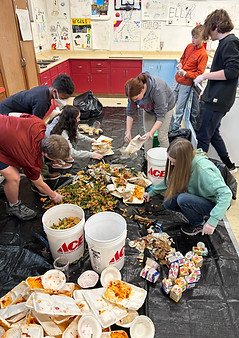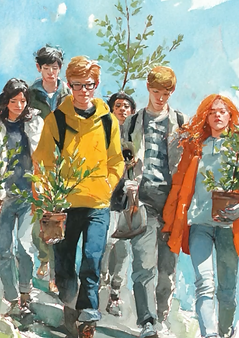
Hopeful Stories
Middle Schoolers Hungry For Change
Mike Loots’s middle schoolers do three awesome action projects about food systems!

Want to learn more or get support?
💬 Mike: mike.loots@mtnviews.org
🌱Karen at RegenerationCorps: karen.nrcd@gmail.com
Collaborative River Art
Brooke Piana’s advanced art students turn climate anxiety into climate agency!

Want to learn more or get support?
💬 Brooke: brooke.piana@mtnviews.org
🦞🌊 Rudi at White River Partnership:
Kindergarten Worms and Cycles
Lauren Edward's kindergarteners learn about cycles, worms, compost, and plants all year long!

Want to learn more or get support?
💬 Lauren: lauren.edward@sau100.nh.gov
🌱 Karen at RegenerationCorps: karen.nrcd@gmail.com
Wondering About Flooding
Alyssa Castellini’s fifth graders learned tons about climate science by asking good questions!

Want to learn more or get support?
💬 Alyssa: Acastellini@wrvsu.org
🦞🌊 Rudi at White River Partnership:
Kinderguardians of the Forest
Leslie Connolly's kindergarterners turned thier passion for red efts into a citiz75 kindergarteners from Ray School built incredible troll sculptures from upcycled materials!en science project!
.png)
Want to learn more or get support?
💬 Chat with any of the teachers: leslie.connolly@rayschool.org, michelle.landry@rayschool.org, angelahotvet@hanovernorwichschools.org, or Sdoiron48@gmail.com
Woodstock Riparian Restoration
Janis Boulbol’s students repair a stretch of flood damaged river on their school campus!

Want to learn more or get support?
💬 Janis: janis.boulbol@mtnviews.org
🦞🌊 Rudi at White River Partnership:
rudi@whiteriverpartnership.org
Salamander Scientists
Leslie Connolly's kindergarterners turned thier passion for red efts into a citizen science project!

Want to learn more or get support?
💬 Leslie: leslieconnolly@hanovernorwichschool.org
🦉Hannah at VINS: hgelroth@vinsweb.org
🌲Jennie at Marsh-Billings-Rockefeller National Historic Park: jennie_friedman@nps.gov
4th Grade Gardeners
4th graders from Woodstock Elementary worked with someone from the IT/Library staff to create a year round gardening project!

Want to learn more or get support?
🌱Karen at RegenerationCorps: karen.nrcd@gmail.com
Super Composting
Devin Burkhart’s sixth graders became compost super heroes!

Green Building Design Project
6th graders at The Prosper Valley School learn about science, architecture, and personal action as they design and build models of sustainable buildings.

Want to learn more or get support?
💬 Andy: andy.wood@mtnviews.org
VINS Science Symposium
Over 100 students from five schools gathered for a day of presenting their ECAP project result, a keynote from a VT State climate scientist, and other science oriented activities.
Want to learn more or get support?
💬 Joan Haley: joan@ed4climateresilience.org
🦉Hannah at VINS: hgelroth@vinsweb.org


ECAP
Engagement in informed community action is the most direct path toward developing the knowledge and skills essential to environmental and social wellbeing. For those feeling climate anxiety, action also builds hope based on the visible results of student efforts. ECAP supports preK-12 teachers in the Upper Valley and their students as they create and implement REAL climate and community stewardship projects.
ECAP offers:
-
A stipend to support teacher participation.
-
Free workshops with real life, local examples and strategies for education about our changing climate.
-
School-wide grants to bring impactful projects to life.
-
Opportunities for students to showcase, celebrate and share their achievements.
-
Connections with other educators and resources to support your work.
Getting REAL
a framework for educating about our changing climate
Relationships
Cultivating a Healthy Foundation for Climate Stewardship
Building strong, healthy connections with self, others, and nature lays the groundwork for social and emotional development in climate stewardship. Reflective, place-based, and immersive practices, like nature- and community-based activities, deepen students' understanding of their personal and collaborative role in stewardship.
Ethics
Understanding Systems and Centering Values
Engaging with environmental and social challenges helps students confront the ethical dimensions of systems that harm people and planet. Through examining the roots of extractive practices and envisioning regenerative alternatives, students develop a deeper understanding of fairness, responsibility, and their role in shaping just and sustainable futures
Action
Making Meaningful and Visible Change
Action, while hard to do, is a crucial part of building hope in our students as they see that they can make a difference. Focusing on healing and restoring ecosystems in the context of place can change the dynamics of unhealthy and, potentially dangerous, practices and systems.
Leadership
Building a More Climate Resilient Culture
Leadership is an invitation for both educators and students to amplify their impact through collective action, recognizing we need to encourage the voices and gifts of others to participate in climate resilience. In a distributed leadership model, we help students find places where they can shine.
ECAP Topics
Topic Champions that work in the Upper Valley are here to support your projects. Learn who they are and get some ideas by clicking links below.
